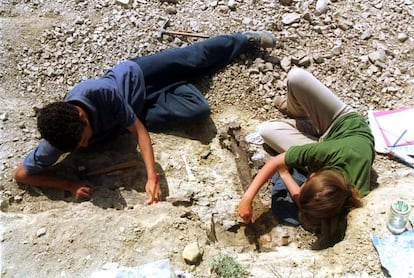Huge dinosaur cache uncovered in Lleida
Cheese-shop owner and his son find massive hadrosaurid site


A cheese-shop owner and his son have turned unlikely paleontologists after stumbling across a major cache of hadrosaurid -- or duck-billed dinosaur -- bones in Catalonia.
Pere Galceran got in touch with the Conca Dellà Museum and the Miquel Crusafont Catalan Institute of Paleontology several weeks ago after his son, Lo Pere Xic, found the remains while out tending to the family herd in the town of Basturs, Lleida province.
The pair recognized the fossils as prehistoric remains as soon as they saw them.
Remains of more than a thousand dinosaurs have been found in the area and Basturs residents are familiar with their appearance.
However, the paleontologists who confirmed the discovery believe this most recent site to be of particularly spectacular proportions.
They are very big bones, and there are a lot of them"
The scientists, who are directed by Àngel Galobart, began excavating the area on Monday as a matter of urgency as they are worried that the bones, many of which are poking out of the ground, may be plundered by unscrupulous dinosaur bone hunters.
"They are very big bones, and there are a lot of them," a Conca Dellà Museum spokesman told EL PAÍS.
The paleontological team's first assessment of the newly named Costa de les Solanes site believes it to be an immense find that will be investigated for many years to come.
Its studies have already classified the first bones as belonging to some type of hadrosaurid - large herbivores from the Upper Cretaceous period of around 70 to 65 million years ago.
Many traces of hadrosaurids have previously been found in the area, but this new discovery promises to be something exceptional.
The Costa de les Solanes site, like the others, preserves the remains of some of the last dinosaurs to live in Europe before a global catastrophe - that many scientists believe may have been the result of an enormous meteorite hitting the Earth - wiped them out.
The excavation will continue until Friday and forms part of the Catalan Pyrenees dinosaur research project.
Tu suscripción se está usando en otro dispositivo
¿Quieres añadir otro usuario a tu suscripción?
Si continúas leyendo en este dispositivo, no se podrá leer en el otro.
FlechaTu suscripción se está usando en otro dispositivo y solo puedes acceder a EL PAÍS desde un dispositivo a la vez.
Si quieres compartir tu cuenta, cambia tu suscripción a la modalidad Premium, así podrás añadir otro usuario. Cada uno accederá con su propia cuenta de email, lo que os permitirá personalizar vuestra experiencia en EL PAÍS.
¿Tienes una suscripción de empresa? Accede aquí para contratar más cuentas.
En el caso de no saber quién está usando tu cuenta, te recomendamos cambiar tu contraseña aquí.
Si decides continuar compartiendo tu cuenta, este mensaje se mostrará en tu dispositivo y en el de la otra persona que está usando tu cuenta de forma indefinida, afectando a tu experiencia de lectura. Puedes consultar aquí los términos y condiciones de la suscripción digital.








































